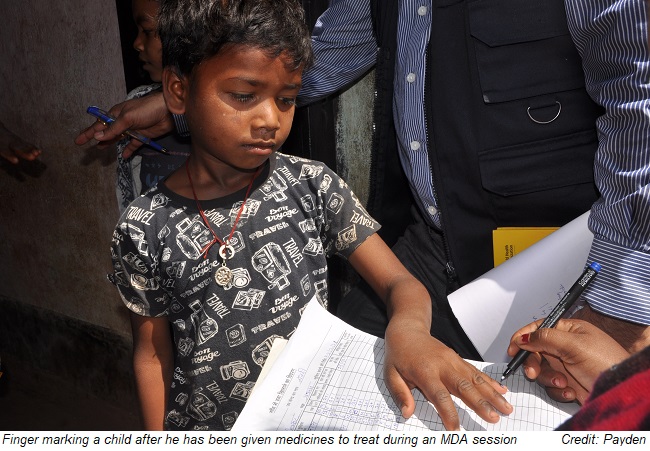Mr Braja Dulal Ghosh from Sian Sukhbazar village in the Bolpur block of Birbhum District in West Bengal gave up farming some years ago because he couldn’t walk. He is just 45 years old.
Mr Ghosh has lymphedema, popularly referred to as elephantiasis because it is characterised by the enlargement and hardening of the limbs and other parts of the body due to swelling in the tissues.
He grew up watching his mother suffer from the lymphedema (swelling in the limbs), also known as Hatipao (elephant leg) in Hindi and Godh in the local language. Thousands suffer from the disease in Birbhum District in West Bengal.

India bears one-third of global burden of LF, which causes permanent disability if left untreated. There are around 900 000 cases of lymphedema (swollen legs) in the country and providing basic care and management is very crucial in preventing further disability.
Mr Ghosh noticed the first signs of LF began close to two decades when a gradual swelling appeared in his right leg. The swelling progressed from minimal to advanced lymphedema over the next few years.
Soon, he could barely wear a shoe or walk without discomfort. Mr Ghosh also began experiencing episodes of acute pain, fever and inflammation in right leg called Acute Filarial Attacks, which completely incapacitated him and led to stigma and social isolation.

Mr Ghosh and his wife were among scores who attended the Morbidity Management and Disability Prevention (MMDP) camp organized in the district by State Health Department with the technical support of WHO to provide health and care services close to their homes.
Health workers were also sensitized on care practices of people with lymphedema and on regular follow up and management of the disease.
Self-care kits provided free under the country’s Elimination of Lymphatic Filariasis Programme were distributed and self-care practice was demonstrated to affected patients and their families.

The WHO NTD team provides support to the programme in Mass Drug Administration, Transmission assessment surveys, by training health care providers on morbidity management and disability prevention, advocacy to States for distribution of treatment kits to lymphoedema patients; updating line lists of lymphedema and hydrocele cases and advocacy for conducting hydrocele operations. These services help to alleviate the suffering caused by the disease and improves compliance of preventive chemotherapy among population at risk so that the next generation can live in a Filaria-free world.
